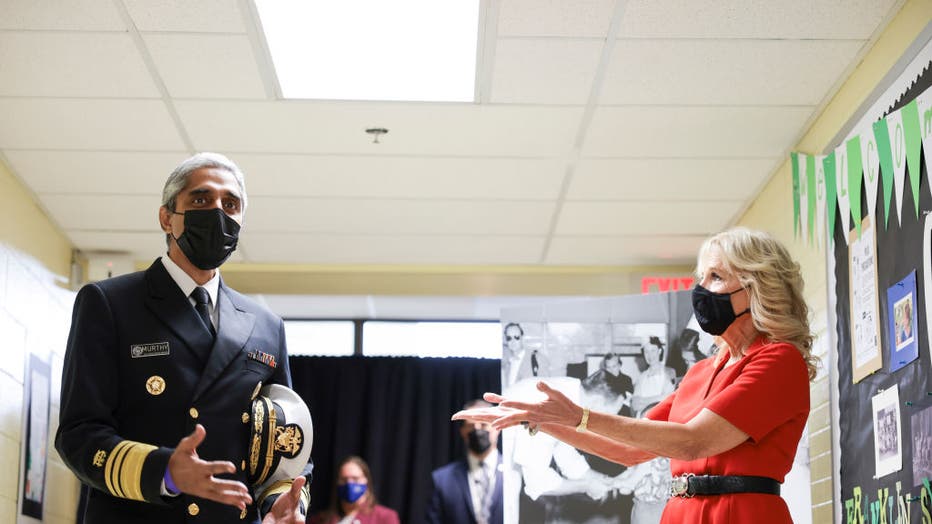US surgeon general releases guide to combating COVID-19 misinformation
WASHINGTON - The U.S. Surgeon General on Tuesday released a guide aimed at combating the spread of COVID-19 misinformation, including tips on how to talk with friends and family, as well as advice on how to evaluate the accuracy of all health-related content.
As surgeon general, Dr. Vivek Murthy serves as the nation’s top doctor and is tasked with providing Americans with the best scientific information available on how to improve their health. While health misinformation is not a recent phenomenon, Murthy says it has spread in recent years "at unprecedented speed and scale, especially online."
Particularly with the onset of the COVID-19 pandemic, health officials say such misinformation has caused confusion and led people to reject public health measures such as masking and physical distancing, decline COVID-19 vaccines and use unproven treatments. What’s worse, disinformation — or "misinformation that is spread intentionally to serve a malicious purpose" — has also threatened the U.S. response to COVID-19 and prolonged the pandemic, risking lives.
U.S. regulators on Nov. 2 gave the final signoff to Pfizer’s kid-size COVID-19 shot for children as young as 5, opening up a major expansion of the nation’s vaccination campaign. Murthy’s new step-by-step toolkit to combat misinformation aims to help families navigate this issue.
"With the authorization of COVID-19 vaccines for children 5 to11 years old, it is more important than ever that families have access to accurate, science-based information. Health misinformation is spreading fast and far online and throughout our communities," Murthy said in a statement. "The good news is that we all have the power to help stop the spread of health misinformation during this pandemic and beyond."

First lady Dr. Jill Biden and U.S. Surgeon General Dr. Vivek Murthy arrive to Franklin Sherman Elementary School to visit a pediatric COVID-19 vaccination clinic on Nov. 8, 2021, in Mclean, Virginia. D(Photo by Anna Moneymaker/Getty Images)
RELATED: COVID-19 vaccine for kids: Jill Biden, surgeon general kick off US campaign
What’s in the U.S. surgeon general’s health misinformation guide?
The surgeon general’s community toolkit provides specific guidance to individuals, health care professionals and administrators, teachers, school administrators, librarians, and faith leaders. It offers tips to better understand, identify and stop the spread of health misinformation in their communities.
Murthy previously issued an advisory in July that warned the American public "about the urgent threat of health misinformation." The new toolkit builds on this warning, offering specific action steps to take when faced with false or misleading information.
"We now live in an era of information overload," the guide states. "It’s becoming harder to navigate the overwhelming amount of information we see every day. Not only is there more information, some of it is false or misleading. It’s hard to know who or what to trust, and it requires us to learn a new set of skills."
The surgeon general’s guide defines health misinformation as "information that is false, inaccurate, or misleading according to the best available evidence at the time." It notes that while it’s normally spread online or via text messages or emails — it can also be shared in speeches, in advertisements, by media outlets or simply in conversation.
"Mostly, misinformation is shared by people who do not know the claims, images or videos are false or misleading. They are sharing because they want to help people and would hate to think that they were hurting them instead," the guide says.
Tips on how to talk to loved ones about COVID-19 misinformation
When talking about misinformation with a friend or family member, the toolkit advises people to "listen to their fears and why they believe what they do." It encourages people to empathize and ask questions to try and understand where they’re coming from, and discuss how hard it is to get accurate information while pointing to sites that do a good job of being transparent.
It warns against publicly shaming the person: "Where possible, try to have conversations one on one, either face to face or via direct messages on social media sites. Remember, no one likes to appear wrong."
The guide also suggests using "inclusive language that makes it clear that you see yourself being impacted in the same way."
One section is even called "If you're not sure, don't share!" and provides a checklist of all the steps to take to ensure the information is accurate and is provided by a trusted source.
Health misinformation and the role of tech companies
The surgeon general’s toolkit comes as technology companies have faced heightened scrutiny for the role many platforms play in the spread of health misinformation.
Youtube, Facebook and Twitter banned misinformation about COVID-19 early on in the pandemic but a deluge of false claims about the virus has proved challenging for the platforms. YouTube said in September that it had removed over 130,000 videos for violating its coronavirus vaccine policies since 2020 and began blocking all anti-vaccine content on its platform.
Twitter and Facebook, whose corporate name has been rebranded as Meta, have each instituted their own policies on COVID-19 misinformation and said they attach labels to misleading content and remove the worst of it.
But last month, thousands of pages of internal Facebook documents obtained by Frances Haugen, a former Facebook product manager-turned-whistleblower, were released and painted a more troubling picture.
Haugen provided the trove of documents to Congress, showing that in the midst of the COVID-19 pandemic — Facebook carefully investigated how its platforms spread misinformation about life-saving vaccines. The documents revealed that rank-and-file employees regularly suggested solutions for countering anti-vaccine misinformation on the site, to no avail.
RELATED: Facebook Papers: Company froze as anti-vaccine comments swarmed users
The papers themselves are redacted versions of disclosures that Haugen has made over several months to the Securities and Exchange Commission, alleging Facebook was prioritizing profits over safety and hiding its own research from investors and the public.
This story was reported from Cincinnati. The Associated Press contributed.




